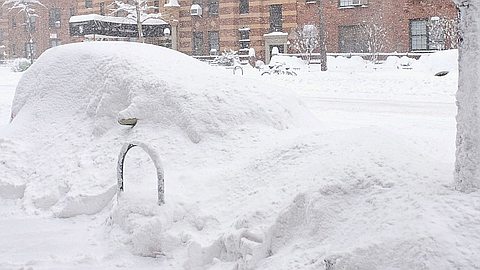By 2030 Seen by U.S. Intelligence Services

NIC, cousin of the CIA, is somehow arm analytic and prospective U.S. intelligence services. His report imagines the world of 2030. It has strong tropism for logically geopolitics but it has the intelligence to remember that nations, societies live on a planet whose physical limitations are proving increasingly obvious that human beings have basic needs (food, drink, shelter, heat, move) and not being able to meet is also a factor of instability in the world. I will leave the purely diplomatic and geostrategic journalists and bloggers who specialize in these areas to dwell on how U.S. intelligence services see Mother Earth in 2030.
The report makes a connection between today's world and the major transitions in History: 1815 (end of the Napoleonic Empire), 1919 and 1945 (aftermath of two world wars), and 1989 (fall of the Berlin Wall and the end of East-West confrontation). Each time, they say, the road to the future was not all mapped and several options were available in the world. It's the same for years that we offer. But among the factors that compel the future, there is one role: demographics. 2030, it is a planet of 8.3 billion people (against 7.1 at the end of 2012), a global aging and increasingly urbanized since, as announced a study published in September I echoed myself, about 5 billion people will live in town. That compares with 750 million were urban and Earth 1950 (of a total population of 2.5 billion people).
Sixty percent of the world population in cities, it is not without consequences, especially for the environment. The report explains that historically, increasing urbanization "has led to drastic cuts in forests, negative changes in nutrient content and soil microbial composition, alterations in the diversity of plants and higher animals (including local extinctions ) as well as changes in the availability and quality of fresh water. In some studies, these impacts were detected at distances sometimes exceeding 100 kilometers from the nearest urban center. "
In addition to the demographic challenge challenges climate and food. And all three are intertwined. A simple extrapolation of current trends in food consumption gives results likely to draw some flags. Due to population growth and changes in dietary habits in emerging markets, global demand for food will increase by over 35% by 2030. But crop yields, even if they continue to improve, do not follow the same slope and, according to the report, we already live on reserves: "In seven of the last eight years, the world has consumed more food than it has produced. A large international study estimated that by 2030, the annual water will reach 6900 billion cubic meters, or 40% more than current sustainable resources. " The report adds that in less than two decades, almost half the world's population live in areas subject to significant water stress and it clearly evokes the question of water wars.
Pressures on water resources and food are also likely to be exacerbated by climate change. In the aftermath of the failed negotiations of Doha on limiting greenhouse gas emissions, which reflect the obvious lack of commitment of the United States in the fight against global warming, it is not without some irony that we bed, under the pen of U.S. officials, fears that the phenomenon raises. Even if the climate skeptics have good press overseas and if some of them serve in the House of Representatives and the Senate, when it comes to serious matters and risks for the United States, nobody, in high places, no doubt of the reality of global warming. The report could not be clearer on the subject. Although its authors refuse, probably because of the "climatosceptiquement correct" effective in the majority of Americans, too highlight the results of climate models, they are forced to recognize that the world is moving towards an increase in average temperature of "about 2 ° C by mid-century. emissions If [] greenhouse gas emissions] continue on the current trend, an increase of 6 ° C at the end of the century is more likely than 3 ° C This will have consequences even more important. "
This does not bode well for food safety issues. Not only will the larger population, not only the populations of emerging countries, thanks to the increase in their incomes, already changing their diets to include more meat, whose production is expensive and water cereals, not only mega push and nibble farmland, not only yields are not necessarily in the appointment, particularly in Africa, not only some overexploited soils degrade, but now that climate change has also disrupt industry food: more frequent extreme weather events, changes in rainfall patterns, disappearance of glaciers that feed rivers during the dry seasons, etc.. We will not be surprised to find, head of the proposed solutions to address any food crises, the use of genetically modified plants.





